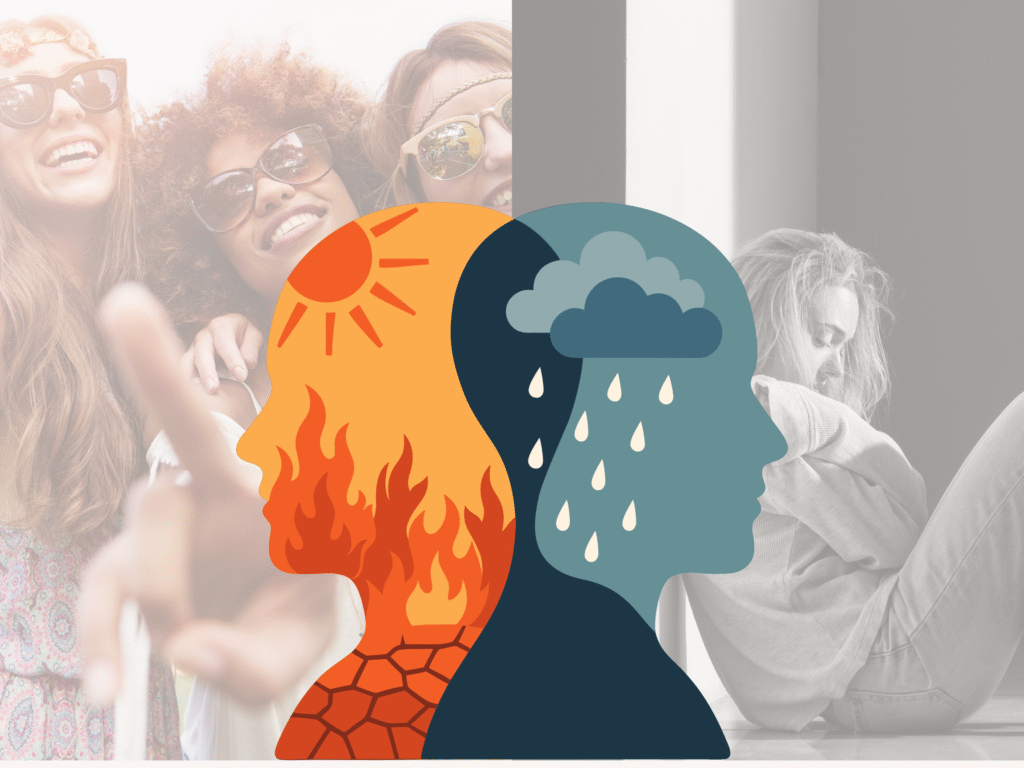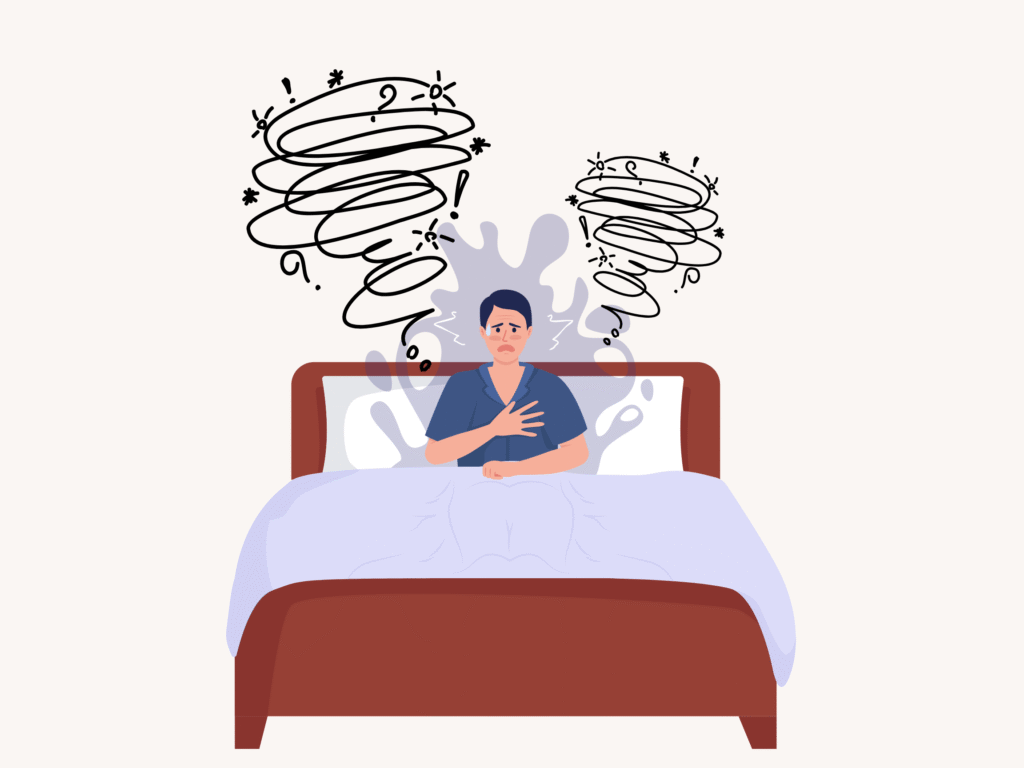
What Are the Most Common Mental Health Challenges?
According to the Canadian Chronic Disease Surveillance System (2019), 15% of Canadians every year will use health services for mental illnesses. This number only accounts for people with diagnosed mental illnesses, and in reality, many more people fly under the radar, undiagnosed and untreated. That could include your family or friends, your next-door neighbours, the people you pass on the street, or even you. Mental health concerns are more prevalent than you may expect. It’s okay to seek help.
Here are four of the most common mental illnesses:
1. Anxiety Disorders
This is a group of mental illnesses that all involve anxiety, which is described as a feeling of nervousness about future events. The two most common anxiety disorders are Generalized Anxiety Disorder (GAD) and Social Anxiety Disorder (SAD).
Generalized Anxiety Disorder (GAD):

GAD involves continuous feelings of anxiety that happen most of the time, but are not focused on any particular situations or objects. For most people without GAD, it is normal to feel some anxiety occasionally, but with GAD, the anxiety is excessive and ongoing, to the point that it will interfere with your daily life. Other than excessive anxiety, other symptoms can include restlessness, having difficulties sleeping or concentrating, and being irritable.
Social Anxiety Disorder (SAD):

Social Anxiety Disorder is characterized by an irrational and persistent fear of social situations. This fear is so intense that it will disrupt an individual’s ability to function normally. Those with SAD are anxious about socializing, and afraid of being rejected, judged or humiliated in public. Due to their fear, they will try their best to avoid social situations. Physical symptoms such as heart palpitations or trembling can also occur when socializing.
2. Mood Disorders:
Mood disorders group together mental illnesses that involve severe changes in one’s mood. The most common mood disorders are Major Depressive Disorder (MDD) and Bipolar Disorder.
Major Depressive Disorder (MDD):

MDD involves experiencing a depressive episode, which is described as a period of low mood. Often in a depressive episode, a person may lose the ability to feel pleasure in day-to-day activities and things they regularly enjoy. They may have feelings of guilt, indecisiveness or worthlessness. Symptoms could also include sleep disruptions (sleeping too much or too little), changes in appetite and low energy.
Bipolar Disorder:

Bipolar Disorder is classified by extreme mood swings, alternating between depressive and manic episodes. Manic episodes are periods of high mood, characterized by exaggerated feelings of euphoria or irritability. As opposed to depressive episodes, those in manic episodes will find intense pleasure in everything. They will usually experience heightened energy, become very active, and require less sleep. Often, they are impulsive, reckless, talkative and distractible.
3. Post-Traumatic Stress Disorder (PTSD):

PTSD develops as the result of experiencing trauma, which are dangerous or scary events that involve extreme stress. People with PTSD can re-experience the traumatic event through flashbacks or recurring dreams or memories connected to the event. They will also try to avoid situations, objects, thoughts or feelings that relate to the traumatic event. PTSD can lead to hypervigilance, difficulty concentrating or falling asleep, irritability and recklessness. Their thoughts and emotions are also impacted, leading to symptoms such as negative thinking patterns, difficulty recalling the traumatic event, and losing interest in pleasurable activities.
4. Substance Use Disorders (SUDs)
Substance Use Disorders are a group of disorders that describe the problematic use of substances such as illegal drugs, alcohol, nicotine and caffeine, that lead to harmful consequences on one’s life. For example, someone with a SUD may find that finding, using and recovering from the substance takes up a lot of their time. This will interfere with their daily life, making them unable to fulfill responsibilities, have time for social, work-related or fun activities, or maintain good relationships. They can also experience tolerance or withdrawal from the substance, which indicates addiction, the most severe form of SUD. In Canada, the most common SUD is Alcohol Use Disorder (Stephenson, 2023).

Why Seeking Help Matters
If you’re facing anxiety, depression, or any other mental health concern, know that you’re not alone. Many people experience these feelings, and reaching out for support is a brave step toward feeling better. Therapy provides a warm, judgment-free space to share your thoughts, learn practical tools, and rediscover your strength. At Grace Health Centre, we’re committed to walking alongside you on your journey to mental wellness.
At Grace Health Centre, we offer compassionate, caring and personalized counseling services with our team of skilled therapists, physicians, and psychiatric specialists. We’re here to support you and your loved ones with tailored therapy to help you thrive. We also partner with Black Creek Community Health Centre to offer specialized substance abuse support groups, ensuring you have access to the resources you need. Take the first step toward a brighter tomorrow—contact us today to schedule a session or explore our services.
*Disclaimer: The information in this blog post is for educational and informational purposes only and is not intended as medical advice. Should you have been struggling any emotional or mental health challenges and would like to seek professional helps, please talk to your family physician, or professionals like Registered Social Worker or Registered Psychotherapists.
References:
Canadian Chronic Disease Surveillance System (CCDSS). (2019). Mental illness and alcohol/drug-induced disorders (use of health services) (aged 1+). Government of Canada. https://health-infobase.canada.ca/datalab/mental-illness-blog.html
Stephenson, E. (2023). Mental disorders and access to mental health care. Statistics Canada. https://www150.statcan.gc.ca/n1/pub/75-006-x/2023001/article/00011-eng.htm







